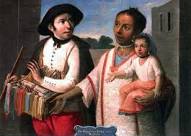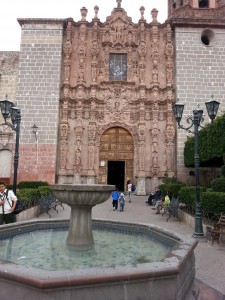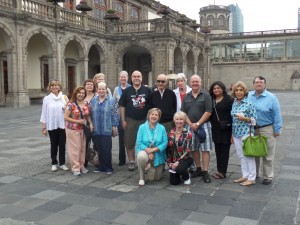Saturday’s Gálvez Symposium was a tremendous learning experience. Dr. Moramay Lopez-Alonso and Dr. Gonzalo Quintero Saravia both emphasized the impact of the Enlightenment on Bernardo de Gálvez and the people of the time.
As Viceroy of New Spain, Bernardo de Gálvez was considered by the Creole elite of the city to be a threat to the established order. First, of course, because he came at the orders of Carlos III to impose new taxes and make the empire more efficient. Second, because he, and his father Viceroy Matías de Gálvez before him, had been sent to remove the untrustworthy local Creoles (those Spaniards born in the New World who were more loyal to their native towns than to the king) from lucrative government offices. And third, because of his radical views of the Enlightenment.
Bernardo espoused the new ideas of Reason as proposed by the French, German and English philosophers of the Enlightenment. Among their precepts was the equality of man. It was a radical new idea, and not one the nobility could accept easily. The religious view of hierarchy had set an established order in the society. Just as man was subject to his priests, and they to their king and the king to God, so the social hierarchy did not allow for equality among men. There were serfs and there were nobles. Women and children were always inferior to men, and peasants inferior to upper classes. The ideas of the Enlightenment could not alter this established hierarchy.
For centuries, the Catholic Church had insisted on the responsibility of the nobility to care for their workers or serfs. The idea came from the early Christian Church and the Middle Ages. Just as God cared for his flock, so the King was expected to be the “Father” of his people. One appealed to the King for redress or to receive land or mercy. Serfs and peasants could appeal to their lords for aid. They didn’t always get it, depending on the personality of the noble whom they served, but they could ask.
In Europe, as in the New World, there had always been a sense of noblesse oblige, the duty of the rich to care for the poor. It had been a concept supported by the Catholic Church since its inception. If one accepted these new ideas of equality espoused by the Enlightenment Philosophers (including, heaven forbid, women’s equality), then it was every man for himself and the devil take the hindmost. Nobles no longer had to worry about caring for the poor.
When Bernardo de Gálvez arrived in the New World in 1785, there had been droughts and the crop failures had been devastating. Famine was rampant throughout New Spain. Rather than shrugging off the starving poor as most of the nobility were doing—it was God’s will, after all—Bernardo came to their aid.
The Spanish had always maintained “alhondigas” (I had, by accident, incorrectly used the word albondigas which are actually meatballs) or community granaries where grain was stored for hard times. Corn was sold to the people when it was needed. Bernardo, the scandalous new Viceroy, opened the granaries and used his own money to buy grain to hand out to the poor. While at the Archives in Mexico City, I learned that Bernardo formed a consortium of the wealthy to contribute over $100,000 pesos for the purchase of grain for the poor. The wealthy, evidently, did it grudgingly and didn’t care for having to share their wealth. (My, that sounds familiar!)
 Bernardo even went to the scandalous extent of suggesting the wealthy should change their habits. They had always flaunted their wealth by having six or even eight horses or mules to pull their carriages. Bernardo tried to lead by example, insisting on only two mules for the Viceregal carriage. His explanation? The animals were eating corn which could better be given to the poor of Mexico. Out of embarrassment, the nobility were forced to give up their animals as well. They didn’t like it. The poor, on the other hand, worshiped Bernardo de Gálvez.
Bernardo even went to the scandalous extent of suggesting the wealthy should change their habits. They had always flaunted their wealth by having six or even eight horses or mules to pull their carriages. Bernardo tried to lead by example, insisting on only two mules for the Viceregal carriage. His explanation? The animals were eating corn which could better be given to the poor of Mexico. Out of embarrassment, the nobility were forced to give up their animals as well. They didn’t like it. The poor, on the other hand, worshiped Bernardo de Gálvez.
Viceroy Gálvez saved the country by encouraging the planting of crops in areas that did have rain and transferring the food to areas where there was famine. He encouraged everyone to share the burden, and did everything in his power to help the poor. They loved him for it.
The elite, however, saw him as a danger to their way of life. They accused him of completing Chapultepec Castle so he could stage a revolution and make himself King of New Spain. They saw him as a radical revolutionary. Dr. Lopez Alonso even suggested that the nobility may have poisoned him because of his radical ideas. Dr. Quintero disagreed. He said Gálvez died of natural causes from some virus or pathogen he picked up elsewhere. That would make an interesting detective story.
Whichever the case may be, the death of Viceroy Bernardo de Gálvez at only 40 years of age was deeply mourned by the people of Mexico. But the scandalous new ideas of the Enlightenment continued to spread throughout the New World. Within only forty years, they led to the independence movements of Latin America.
So, the nobility may have been right. Bernardo de Gálvez did, indirectly, start the revolutions in Latin America.





… [Trackback]
[…] Find More Info here to that Topic: carolinacastillocrimm.com/tidbits-from-history-on-the-enlightenment/ […]
… [Trackback]
[…] Read More to that Topic: carolinacastillocrimm.com/tidbits-from-history-on-the-enlightenment/ […]
… [Trackback]
[…] Info to that Topic: carolinacastillocrimm.com/tidbits-from-history-on-the-enlightenment/ […]
… [Trackback]
[…] Here you will find 43370 more Info on that Topic: carolinacastillocrimm.com/tidbits-from-history-on-the-enlightenment/ […]
… [Trackback]
[…] Here you will find 47019 additional Information on that Topic: carolinacastillocrimm.com/tidbits-from-history-on-the-enlightenment/ […]
… [Trackback]
[…] Read More Info here on that Topic: carolinacastillocrimm.com/tidbits-from-history-on-the-enlightenment/ […]
… [Trackback]
[…] Find More here to that Topic: carolinacastillocrimm.com/tidbits-from-history-on-the-enlightenment/ […]
… [Trackback]
[…] There you can find 12901 additional Information to that Topic: carolinacastillocrimm.com/tidbits-from-history-on-the-enlightenment/ […]
… [Trackback]
[…] Read More on on that Topic: carolinacastillocrimm.com/tidbits-from-history-on-the-enlightenment/ […]
… [Trackback]
[…] Find More Information here to that Topic: carolinacastillocrimm.com/tidbits-from-history-on-the-enlightenment/ […]
… [Trackback]
[…] Find More here on that Topic: carolinacastillocrimm.com/tidbits-from-history-on-the-enlightenment/ […]
… [Trackback]
[…] Find More on to that Topic: carolinacastillocrimm.com/tidbits-from-history-on-the-enlightenment/ […]
… [Trackback]
[…] Here you will find 83034 additional Info on that Topic: carolinacastillocrimm.com/tidbits-from-history-on-the-enlightenment/ […]
… [Trackback]
[…] Read More here to that Topic: carolinacastillocrimm.com/tidbits-from-history-on-the-enlightenment/ […]
… [Trackback]
[…] Find More to that Topic: carolinacastillocrimm.com/tidbits-from-history-on-the-enlightenment/ […]
… [Trackback]
[…] There you will find 943 additional Information on that Topic: carolinacastillocrimm.com/tidbits-from-history-on-the-enlightenment/ […]
… [Trackback]
[…] Find More Information here on that Topic: carolinacastillocrimm.com/tidbits-from-history-on-the-enlightenment/ […]
… [Trackback]
[…] Info to that Topic: carolinacastillocrimm.com/tidbits-from-history-on-the-enlightenment/ […]
… [Trackback]
[…] Read More on that Topic: carolinacastillocrimm.com/tidbits-from-history-on-the-enlightenment/ […]
… [Trackback]
[…] There you can find 86532 more Info on that Topic: carolinacastillocrimm.com/tidbits-from-history-on-the-enlightenment/ […]
… [Trackback]
[…] Find More on that Topic: carolinacastillocrimm.com/tidbits-from-history-on-the-enlightenment/ […]
… [Trackback]
[…] There you can find 78977 more Information to that Topic: carolinacastillocrimm.com/tidbits-from-history-on-the-enlightenment/ […]
… [Trackback]
[…] Info on that Topic: carolinacastillocrimm.com/tidbits-from-history-on-the-enlightenment/ […]
… [Trackback]
[…] Read More on on that Topic: carolinacastillocrimm.com/tidbits-from-history-on-the-enlightenment/ […]
… [Trackback]
[…] Find More Info here on that Topic: carolinacastillocrimm.com/tidbits-from-history-on-the-enlightenment/ […]